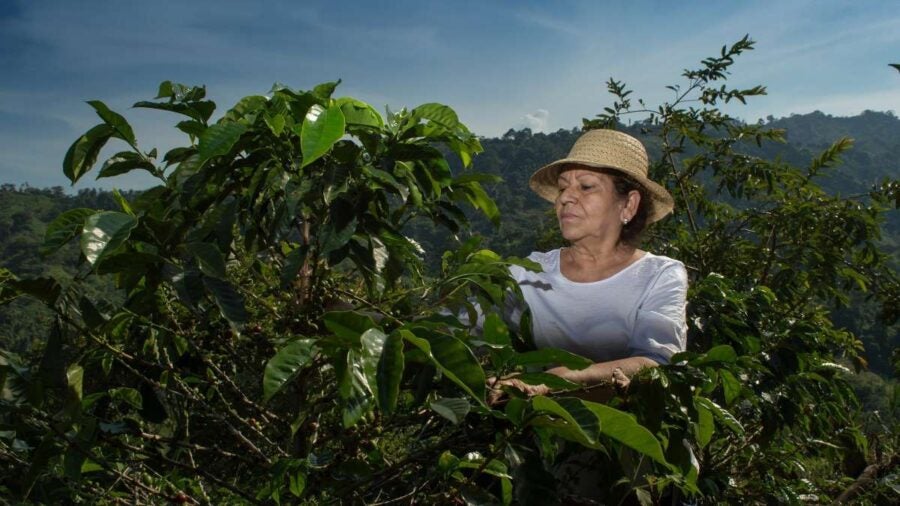
Almost 100m cups of coffee are enjoyed every day across the UK, according to the British Coffee Association. But those cups of coffee – whether they are crafted in pod, instant, espresso or filter form – are in danger.
The International Coffee Organisation indicated this year that four of the top five coffee-producing countries around the world will see a decreased suitability for production before 2050 due to the effects of climate change.
To ensure a future for coffee production, something has to change. And, one of the world’s biggest producers of coffee is taking a stand to make that change happen. Nespresso has been working for almost 20 years to transform the way coffee is farmed and produced in order to protect the environment and ensure a future for those who farm it.
“We really believe coffee can be a force for good,” says Mary Child, sustainability lead at Nespresso. “We want it to have a positive impact on our customers and the farmers we work with, as well as nature and the environment. That’s why regenerative agriculture is so important for us. We want to use the power of coffee to restore ecosystems and to protect the environment.” She says this commitment will help coffee producers build resilience in the face of climate change.
By protecting the livelihoods of farmers, and supporting them in adapting to new climate realities, Nespresso is also safeguarding the future of coffee. To do so, Nespresso is working with the Rainforest Alliance, through its AAA Sustainability Quality Program, to support farmers in transitioning to regenerative agricultural practices.
A recently launched scorecard is making this simple by focusing on proactive changes farmers can make – like building a flood barrier in areas now prone to flooding – to safeguard their crops. The broad range of initiatives are based on impact assessments carried out by the Rainforest Alliance. Thus, the programme is adaptable across different regions and can help farmers respond to different challenges posed by climate change.
Sarah Browne, marketing manager at the Rainforest Alliance, says education and awareness are crucial to the success of the programme. By working together, the two organisations are embedding regenerative agricultural practices throughout the coffee supply chain. “There’s no one perfect solution. We also can’t do it on our own,” she says. “We have to build on the expertise of different organisations and work in collaboration to achieve what we all want to work towards.” She adds that regenerative agriculture is almost like “taking farming back to its roots” in terms of repairing and restoring the earth as it is farmed.
Working in partnership is also crucial to Nespresso’s overall sustainability objectives, like working towards net zero and offering recycling solutions for its coffee pods. It has recently become a certified B Corp in recognition of its work towards building a more sustainable future.
But it’s not enough to simply do the work. Part of the success of Nespresso’s sustainability programme has been its consumer-facing communications. In one example, a QR code on a coffee sleeve documents that coffee’s entire agricultural and supply chain journey from the Democratic Republic of Congo, indicating the sustainable agricultural practices that farmers used to produce it.
Similarly, its recent ‘Empty Cup’ campaign, featuring brand ambassador George Clooney, highlighted to consumers the impact of climate change on coffee production. “We need to see a big transformation in the way that coffee is cultivated so we can protect the future of coffee, protect the environment and protect the livelihoods of those communities,” Child says.
Coffee may be under threat from climate change, but Nespresso is far from accepting that as a foregone conclusion. Working in partnership and building adaptable, practical strategies to support farmers is a crucial step towards protecting coffee far into the future. But the scope for greater sustainability ambitions is broad for Nespresso. The business will not only continue to embed its regenerative agriculture programme, but also keep striving for sustainability across all aspects of its operations.
For more information on how Nespresso is making coffee a force for good, please visit Nespresso

Almost 100m cups of coffee are enjoyed every day across the UK, according to the British Coffee Association. But those cups of coffee – whether they are crafted in pod, instant, espresso or filter form – are in danger.
The International Coffee Organisation indicated this year that four of the top five coffee-producing countries around the world will see a decreased suitability for production before 2050 due to the effects of climate change.
To ensure a future for coffee production, something has to change. And, one of the world’s biggest producers of coffee is taking a stand to make that change happen. Nespresso has been working for almost 20 years to transform the way coffee is farmed and produced in order to protect the environment and ensure a future for those who farm it.

